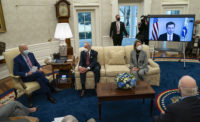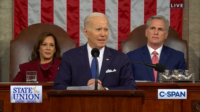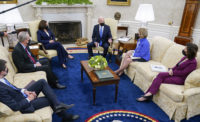In a preview of his upcoming infrastructure plan announcement next week, President Joe Biden gave a strong defense of the importance of increasing U.S. spending on highways, bridges, ports, schools and other facilities.
Speaking at the White House on March 25, in the first press conference of his presidency, he said he wants to “rebuild the nation’s infrastructure, both physical and technological infrastructure …. so that we can compete and create significant numbers of really good-paying jobs.”
Biden has scheduled an appearance on March 31 in Pittsburgh at which he is expected to unveil at least the framework of an economic stimulus proposal published reports say could total $3 trillion or more.
A large part of that amount is likely to be construction-related spending on infrastructure.
Biden didn’t put a price tag on his proposal or discuss how it would be financed.
He did, however, touch on nearly all of the major public works sectors.
He said, for instance, that “the future rests on whether or not we have the best airports that can accommodate air travel, ports that you can get in and out quickly.”
He noted that the quality of infrastructure is key to attracting new business. Biden observed that companies weighing where to locate a new facility ask: “What’s the closest access to an Interstate highway? How far am I from a freight rail? Is there enough water available for me to conduct my business? All of the things that relate to infrastructure.”
The president noted that the U.S. is behind other countries by the infrastructure yardstick, saying that “China is investing three times more in infrastructure than the United States is.”
He added, “I still think the majority of the American people don’t like the fact that we are now ranked, what, 85th in the world in infrastructure.”
Brian Turmail, a spokesman for the Associated General Contractors of America, said in an emailed statement to ENR, "We couldn't agree more with the President about the need to improve our aging and overburdened infrastructure." Turmail added, "He also clearly understands the significant economic benefits that come with those investments, including creating good, high-paying careers and making our broader economy significantly more efficient."
Biden listed some of the metrics that demonstrate the needs. “More than one-third of our bridges, 231,000 of them, need repairs. Some are physical safety risks or [need] preservation work.”
He also added that 20% of U.S. highway mileage is in poor condition and six to 10 million homes have lead pipes connecting to their water lines.
“There’s so much that we can do,” Biden said. “How many schools where the kids can’t drink the water out of the fountain? How many schools are still in the positions where there’s asbestos? How many schools in America we’re sending our kids to [that] don’t have adequate ventilation.”
Climate-Change Impacts
As Biden has said since his presidential campaign, his infrastructure plan will address the effects of climate change.
"We can’t build back [the structures] to what they used to be,” he said. “Global warming's already done significant damage.”
“The roads that used to be above the water level [that] you didn’t have to worry about where the drainage ditch was—now you have to build them three feet higher, because it’s not going to go back to what it was before," he said. "It’ll only get worse unless we stop it.”
“There’s so much we can do that’s good stuff that makes people healthier and creates good jobs," he added.
Turmail said AGC is "eager to work with the administration and Congress to see new infrastructure investments swiftly enacted." But he added the group will oppose adding to the expected bill "new regulatory burdens" and provisions of the House-passed Protecting the Right To Organize, or PRO bill—a top priority of organized labor.






Post a comment to this article
Report Abusive Comment